
Going Blind & Catching Up with PEACE MCALLISTER:
An Interview with STEVE BASKIS
July 21st, 2023
Outreach Coordinator of A Closer Look Inc., Peace McAllister, continues Andrea Yu’s series of interviews with characters from Going Blind (2010) to figure out where they are now in their sight-loss journeys.
Peace spoke with Steve Baskis.
To listen to the interview, use the video player below. A transcript of the interview follows. To view the film, Going Blind, click here.
Peace McAllister: Hi, my name is Peace McAllister. I’m the Outreach Coordinator for Going Blind and Going Forward, an outreach campaign based on the film Going Blind: Coming out of the Dark about Vision Loss. In the film, we tell the personal stories of seven individuals dealing with vision loss. Today on this episode of Going Blind & Catching Up, I talk to Steve Baskis, a veteran blinded in service due to a roadside bomb. In the thirteen years since the film was made he’s done plenty of amazing things including climbing mountains, giving motivational speeches and making his own music. He isn’t the first person we’ve caught up with and won’t be the last. So you should go check out goingblindmovie.com for the others. Anyway, let’s get to the interview interview.
Steve Baskis: I was actually trying to work on some music this morning, a little intro like you were talking about; I just did a little piano and like strings and stuff…
P: I definitely would appreciate that, I mean I’m gonna use it for the intro of this video and the other videos too. If you wanna make something for…
S: Yeah, if you think… I don’t know. I guess usually I would probably listen to the video and then do something but yeah, it’s an orchestral kinda feel. But yeah, I’ll send it over to you and you can decide if you wanna use it or not.
[ORCHESTRAL THEME PLAYS]S: So I’m recording now, and I’ll make sure I turn off my screen reader, and I put my phone in do not disturb. So hopefully, it’s across the board on my computer and everything.
P: I mean.. If you need the reader on, I have no problem with you having the reader on. I think it also goes to demonstrate the kind of stuff that you’re doing and how you’re using it…
S: I don’t need it on if we’re talking but if I wanted to show something, then it would need to be on. If I’m not showing anything then it’s not a big deal. I can turn it on in two seconds…it’s back on now, but I’m gonna turn it back off so it doesn’t talk over. I don’t even know if you’re picking it up really, it may not even be being picked up.
P: No, I can hear it; I can hear it, but it’s no problem. But, it’s nice to see you again, I know we just talked a few days ago to get a test, but i have a few questions for you that I think are good. I spent a lot of time—after watching you’re part of the film—thinking whether or not I wanted to ask you questions that were more based on the film or the questions based on the interview that you did previously, but I think I have a good amount, so if you’re ready to go, I’m ready to go.
S: Ready to go!
P: Great! [Laughs] So, I had talk to Joe recently and I had noticed by the end of the film, you had just moved into your own space and you were trying to become a little bit independent: living by yourself and kinda figuring out how to have your own space as somebody who has vision loss. But then Joe recently told me that when the film premiered you weren’t able to make to make it because you were already climbing a mountain. [Laughs].
S: [Laughs] That’s true I think, I mean the mountain that I climbed that year was in Mexico. That was the only one I climbed. So it must’ve been right around the time of the premiere.
P: So, I guess my first question: in the thirteen years or so that have past since the film was made, all the amount of stuff you’re doing which includes rock climbing, kayaking, skiing, and now your journey into music and sound. I would love to talk about how you’ve accomplished some of these physical tasks, because I think it’s very valuable for people who are in a position like yours who might be interested in doing stuff like this, how they can get start and how they can maybe find their own independence in doing that.
S: How does one adventure and do these athletic endeavors and the technological things that I have participated in—as of recent. I think it was networking in the very beginning. I read some books of some different people that were blind, one specifically a guy named Erik. And I was inspired by his story and just by his family and his life; basically he was a climber and I was interested always in the outdoors, that’s why I served in the military and my occupation was infantry. So, I was not at a desk, I was really always outside in the field. And so, that did change. I was the same person, just lost my sight, and I was sitting there dreaming and thinking and imagining in the hospital “How am I gonna pursue these things that I’ve always dreamt about?” You know? Venturing into the mountains, hiking, traveling the world, seeing things more or less. I always wanted to see the world. And I did not want to—I guess—forget that dream, give up on that dream. So I was like, “There are these people that are doing it, why don’t I reach out to them?” And so, I wrote people. I wrote Erik and I donated a little bit of money because I thought…He was taking these kids on expeditions. I think I watched an Arizona rafting video that was done by some news agency there near Phoenix, and I decided to tell my story in an email and a few weeks later, I got a message. So really, you should be outgoing and try to pursue people or groups of people that are doing the things that you’re interested in, that’s what I would advise or the information I would provide with someone that is interested in climbing or hiking or kayaking or in pursuing anything in that regard. Networking is essential.
P: And what platforms exactly did you find these people to network with them?
S: I can give specific resources in the sense of organizations. But, I mean if you go on the internet and do a Google search—if you’re using a screen reader or if you’re having a friend help—search for adaptive athletics, adaptive recreation. Incorporate blind or visually impaired in the search string for the types of interests you have and see if you if you do find a niche group. Sometimes, it is very difficult to find the groups, but there are Google forums for the technology side of things like for the music and audio that I am pursuing, this degree at Berkley College of Music. I was not too sure if there was group of blind individuals or visually impaired individuals who were working in the industry. And I was for a few years really, trying to find out if it was possible to use the digital audio workstation—ProTools—which is an application for editing and recording audio. And I found that they were working on it and it was becoming more and more accessible and that was just through searching, but I did find people too in groups (like forums) where they were keeping people up to date and providing information about what was on the horizon. It’s the same for the physical things. In Colorado where I live, all the ski-resort towns Breckenridge and Aspen and Vail, Telluride, Steamboat Springs, they all have a specific kind of adaptive program like a headquarters, a building, and a place where usually you can stay for a week—and this is for both civilian and veteran blind, visually impaired, amputee, paraplegic you name it—they work with you and get you out and doing things. It’s not only winter sports but summer sports. It’s just asking questions. For me, I had some friends listening to me and I was telling them how I felt in the hospital and they were bringing me the books, like the audio books, like the book I mentioned. I read a book by Erik Weihenmayer called “Touch the Top.” That book and other books and other individuals who are blind and visually impaired kinda gave me the inspiration or the idea that it’s possible. And “Hey!” whose the best person to ask, you know another blind person or visually impaired person whose doing what you want to do. So, through friends and through searching on the web with my accessible technology or with help from sighted individuals I just networked and found a way to connect and I was open about my story: about the frustrating loss of sight; my worries about being able to accomplish things, do things; how was I going to do it. All that I expressed to people, if you’re silent, if you don’t speak about it, no one knows how you feel, no one knows where you wanna go, what you wanna do. And there are a lot of people who have me accomplish great things. It’s a team effort. So, that’s what I would say.
P: I was gonna say that this was something I was thinking about a little bit because in the film Pat Williams talks about self consciousness and passing as sighted. And I was curious based off of what you just said about being very vocal about your experiences if you in that process were feeling emotions of being a little self conscious about your experience or if the idea that you were able to b very vocal meant that you were very confident in wanting to take that step for yourself.
S: I think…I felt a lot of things right after I lost my sight. I mean, people have to understand that I was a soldier and I volunteered to serve in the military, so I think (of course) I had some confidence and courage to pursue something in a selfless manner as they would say or most people would say in the sense of volunteering to serve in the military and being governed by your country and the government to go off to war to a foreign land. So, a lot of my life before growing up and moving around the country taught me how to adapt and feel strongly about my desires and my ambitions, you know? I think laying in the bed, I was just naturally outspoken about how I felt. And I know that’s not the same for everybody, and even for some veterans. You know, they go extremely quiet, they shut down. That’s the hardest thing, sometimes I think we shackle ourselves. What I mean by that is we lock ourselves in a certain thought process: who we are; what’s happened to us, whatever’s horrible going on. And I always think about when you network like I was talking about before and when you meet people—especially when you meet a lot of people that have a similar problem as you—you start realizing that “Oh! This person likes to climb mountains. Oh! This person likes to do math.” And there’s just a diverse group of people who have a similar injury or problem with their vision but they are all doing things in their own way and why can’t you change your mind and try to focus on one of these paths and ask these people how do you accomplish, how do you set out and do what they’ve accomplished or what they’ve pursued. I think it’s hard of course in the moment to feels these things, it takes time. Ultimately, I wanted to become…I wanted to catch up to where I had left off. I thought I was at like the peak of my life, just starting out, just starting as a 20 year old, 21, 22 year old. And it just wanted to get back to living life, I didn’t want to delay my life. So rehab, recovery, all these things, I was focused, definitely focused on it.
P: Your sight loss is tied to such a violent traumatic event that I was curious if you’ve experience PTSD from that event and if so, if you’re experience with PTSD is different based off your sight loss and how tied it is to your sight loss?
S: PTSD is an interesting thing; I have definitely had post traumatic stress from all kinds of ordeals and challenges I’ve experienced throughout life. I think losing people—I lost friends next to me, one specifically died next to me the day I lost my sight. And y’know, the person was like a father to me; I worked with them day in and day out. You don’t…y’know electronics and computers you can erase the memory or delete a file on your hard drive. A human being, as I grow older, y’know I’m 37 now, you don’t forget. You really think deeply about your past, or at least I do. And maybe some people think a bit too deeply and hold onto certain things, but it definitely still affects me. I can still transport myself mentally back to that time period. It seems like yesterday, even though fifteen years have past almost, May I think will be fifteen years at the time of this recording. So, I deal with it in different ways. And that’s just by being focused, trying to think of the future, about what I can accomplish and not so much about what I can’t do and unsure about, I just gotta try. I just gotta try try try. And not really hold yourself to an idea that you have to be conventional like everybody else, you have to do everything the way it’s taught or society or people do something. It’s being unconventional and the funny thing is in the military, I wanted to pursue and occupation in unconventional warfare and special operations, and so there’s two sides to the military, there might be many depending on the way you look at it. One is the unconventional, one is more conventional and so you look at things in a different way. I think for me, I bring that up because I was thinking about things like this… I wasn’t thinking about blindness and lost of sight, but I was thinking about living an unconventional life and thinking about how to create strategies and tactics and procedures, protocols to accomplish things in horrendous, challenging, adverse environments. I guess blindness is a really big challenge and I am just trying to figure out ways, solutions to solve problems everyday and march forward.
P: Do you mind talking a little bit about some of those unconventional tactics you’ve used to do things like rock climbing, kayaking and those other physical activities you’ve been doing that I think even a seeing person can obviously have a lot of difficulty doing?
S: Yeah absolutely, some of the strategies or tactics whatever you wanna call it. There’s T.T.P (Tactics, Techniques and Procedures) in the military, it’s an acronym, I mean you can call it whatever you want. I think, it was simple. When I was laying in the hospital bed I realized that I had been struck down. And that my physical body and mental—my mind—was definitely challenged. And I had a subdural hematoma bleeding on the brain, lost my eyes because of fragments hitting my head in my eyes, I had shrapnel in my neck both my arms and legs. I lost a lot of blood; I was fatigued I was so tired; I was on the brink of death at times. I recall and feel it still. It was such a strange feeling it was the weakest I’ve ever been in my life and so when laying in the hospital, all I wanted to do was not be weak and to be back where I was: a 20 year old serving in the military strong, confident, and capable and very independent making decisions lead missions in in a combat zone. And that’s what I was doing and now I was laying in a bed. Everything went from 150 miles an hour to zero and all I wanted to do was “Okay. I need to recover. I need to recover. I need to pursue sports or recreation; do something that gets me moving that gets me fit again because I can’t lay here and expect to get better necessarily.” So, I just started to work hard on moving, moving in my bed moving my knee that was hurting. I was just trying to move my legs, stretch, do whatever I could to move. I mean they they put these compression things on my leg because you lay so still all the time to prevent blood clotting and problems so I was worried about that. I was told by the nurses why you have these so I wanted to move. So, as soon as I could get up and stand I was pursuing things. I was looking up ways to go and pursue the things I was talking about like these books and and people that were giving me information. Y’know a climb or or a trip somewhere forces someone to really come out of their comfort zone. And I always looked at it like whatever I do is rehab so if I have to go climb a mountain I have to pack my bags, I have to decide what I’m taking, I have to get myself out of bed I have to do all the things that anybody has to do. You’re worried when you’re blind when you first wake up and you lost your sight how do you do these things y’know. I didn’t know how to do it. I was asking, I was learning rehab everything that I could, but picking to actively do something, to actively pursue something really puts yourself out there and that was a big strategy of mine. So, when I go on a climbing adventure I have to take care of myself just just as much as the people who are taking care of themselves and and as a team we’re working together. And so the whole trip is like…each time I went out and did something in the country whether it was a tandem bike ride or a climb or a swim or whatever it might have been a triathlon, a marathon, I had to take care of my bag, I had to take care of my stuff and that helped me rehab and recover it helped me re-establish a new normal. And that’s what I would tell anybody that they should not stop and pause and let their life tick by y’know five to ten fifteen years. And then you just you meet somebody that’s doing what I’m talking about and you realize wow I should not have I should not have waited so long. I’ve met so many people that told me that over the years that they didn’t…they’re unsure, they were scared, and they stayed home and they stayed kind of protected and I understand why people do that but I think we have to move we have to go live our lives. That’s what I believe.
P: You’ve talked about how losing your sight so rapidly you felt like was an advantage and you’ve also gone on to talk about your youth, so I was curious: A. How you see losing your sight rapidly was an advantage? Then also B. If you feel like losing your sight at such a young age versus losing at an old age would have been an advantage or disadvantage for you?
S: It’s a great question. Losing my sight young and and also quickly in a very traumatic experience, I guess when I evaluate and assess the different interactions and experiences I’ve had with other people over the years, it seems that being young and and having the vision go so quickly, I had to make a decision to to recover. I couldn’t just like beat around the bush or put it off and say “Ah y’know I’ll look at the blind stuff and the visually impaired stuff down the road.” Also, I think low vision, being visually impaired, like being in-between is something I have no idea. Because I had perfect vision, I better than perfect vision. My acuity was like 20 : 19 , 20 : 18 instead of 20 : 20 and and so I went from that to to nothing and I think that just it just provides you this ability; you have you have to make a decision. You really can’t be like “I can use my vision to get by” and I think people, sighted people see visual impairments in a strange way. They kind of just think there’s blind and not blind and there are a lot of different…in my opinion that’s how I feel it seems like that’s what people….when I have conversation with them that’s what they think.
P: Going Blind for example, like before watching the film and before talking and working with Joe, I definitely was part of that group who I guess…I mean I guess theoretically if you had asked me if there was a blind spectrum I would have obviously had to say yes because obviously there are like people with glasses that can see better with or without them.
S: Exactly.
P: But you don’t really think about it on a deeper level unless you are impacted by it or have somebody around you who’s been impacted by it and you don’t see how bigger the spectrum of vision lost is um but sorry to interrupt. Keep going please.
S: No yeah. So absolutely, you’re valid, you kind of verify and confirm what I’m saying. I don’t ever ask people directly but the thing is you know. So yeah, that fast change or traumatic change helped me make a decision quickly. I mean for me at least and being young usually when you’re young you’re resilient, you can adapt quicker. So that’s my perspective on it. Now the elderly individuals I spend time with in blind rehab—Vietnam, Korean, and World War II veterans—when they lost their site at 80, 75, 90, they’ve lived…the way I looked at it it was they’ve lived their life. They’re creatures of habit. They’ve have a certain way of doing things; they’ve had for a long time a certain way of doing things. Humans are pretty much the same. We don’t want a lot of change to happen to us really quickly, y’know it’s very traumatic whatever the change might be. Just like software updates y’know, it changes the whole interface and you’re like where is the button that I need to click on. So it’s the same concept I guess with the vision loss. You don’t want…when you’re so used to doing something for so long you don’t want change to happen so quickly and that’s that’s one of the conversations I had. And more importantly the slow loss of vision, someone that’s losing their vision in a slow way. They have to make decisions about driving, about walking with or without a cane and a lot of times when I thought about it, I was like “It’s a hate love hate relationship with my cane it’s a love-hate relationship with these things that that brand me as a blind or visually impaired person.” So I know—knowing myself—it would be difficult to let go of certain things and I would probably try to be a chameleon and try to look like I’m not blind because I don’t want people to attach that to me. And so, I guess yeah it’s very challenging no matter what but definitely youth and fast loss of sight really made me look at my transition and rehab in such in a way. Like I just explained.
P: Going back to youth and then also some of the tools that you talked about with people making decisions about how to go about existing in the world with their vision loss. In the film during part of it—I don’t know if you remember but—you and Joe walk around while you’re using a cane to get around like a few city blocks it seems like and you talk about how you use the sound of the city to kind of navigate you through the space. And I was curious, if you feel like that use of sound that you have kind of I guess matured since your vision loss may have led you down the path to do musical engineering and sound design and stuff like you’re doing right now. And also if the fact that you were so young and had to use so much technology to kind of make up for the fact that you had lost your vision—if you felt like those two things in combination may have helped you or inspired you to go down this path or if that was something that was completely characteristic of you beforehand or you know…
S: Well I was a musician to some degree before I lost my site. I played, I’ve played the drums since I was 13—off and on as a hobby though for fun, I mean as in a few high school bands but really not a learned musician that took a lot of music theory and stuff. I dabbled with it. And so, I always had this idea that in the back of my mind that I would love to try to learn how to make media y’know: film and and music. But when I chose to serve in the military I knew I was going down a path that could take me completely in a different direction and I honestly loved the path I was on but that dramatically changed of course and so I thought back to my interests and for me personally, I’ve always been someone that has seeked out experiences. I’ve always tried to really diversify my experience and the things I do in life. I really wanted to try to do whatever and experience whatever I can and could. So before I lost my sight, I was moving around the country and experiencing a lot of different things in a lot of different places and traveling outside the country as a young kid and adult gave me a lot of ideas about maybe what I could do, so… I think music and audio is so instrumental in my day-to-day living it definitely, I’ve been probably attracted or influenced because there is this market or group of individuals that are professionals that work with audio that are blind. So with all the technology and the way the world’s modernizing, I’m able to use technology and accessible technology to do things with audio and it just fits. It just fits my lifestyle and I want to share stories and share what I’ve been through and have control of w how I’m being portrayed and what I want to share so it’s just kind of the path that I’ve taken. I could have gone down many other paths or roads but I love music. Music is like therapy to me and it’s always been part of my life and now I’m just investing more in it and blindness is definitely I think made it that more amazing because I listen to things and I listen to the world in such a deep manner that is different from when I was sighted. I have a lot of great memories of being sighted and having all my abilities but blindness has given me a whole new way to look at the world and so yeah music is definitely something that I hope to get better at and that’s what I’m focusing on now among other athletic and sports things still. But yes definitely music has come around because of the blindness and loss of sight.
P: It’s really cool that you are talking about music in that way. I think the music is therapy and being able to have it as a version of being able to tell your own story is also extremely interesting. I was curious if for the benefit of anybody watching including myself, if there’s anything that you’re working on right now.
S: Yeah, I can share my screen…uh…we have the ability…usually I can press Command + Shift + S. So this is like some music I’m fooling around with right now, hopefully if I press play… [Music] So I made this just before we started the interview and so I can…like I played the piano part I can solo it if I hit Shift + S, it’s a Pro Tools command. So this is Pro Tools Digital Audio Workstation and I focused on a specific track, if I press play now we’ll hear just the piano. [Music] So I played this and then after that I I decided to put a violin over it; this is a from a specific kind of orchestral library, it’s very realistic. Here’s it. [Violin Music] It’s playing C major it’s the same, the key is in C major and it’s playing pretty much the same…for the most part the same thing but I’m soloing it so you just hear the violin there and then the other instrument is a it’s a cello if I’m not mistaken. So I have like three octaves like a low in between and then a high with the violin and so you get this. [Music] It’s just some chords, some simple chords and things I’m playing with. I don’t even know, I was just fooling around and I was thinking it could be like an intro or something but yeah that’s kind of like an idea of what I’m doing in a software program but yeah I can show you whatever. But I’m using a screen reader voice over with my Mac computer to move around and do these things and a bunch of computer keyboard shortcuts of course help me as well. So I’ll stop sharing my screen but yeah I hope that kind of gives you an idea. I mean I’m so interested in all kinds of music electronic, orchestral, rock, everything…reggae. I mean I was probably more rock and like metal you know kind of influenced but I really love everything classic rock and all the new stuff you know there’s nothing I don’t really like.
P: Are you…is the plan to eventually maybe have some stuff that’s available online for like Apple Music and Spotify…
S: Oh yeah! Yeah. I have so much to learn, I really don’t know. I’ve been just the last three, two years, since COVID I turned to academics during COVID because we couldn’t go and climb and hike I couldn’t go with teams of people you know everybody was afraid it was very it was very challenging it’s been very difficult actually. But we’ve moved beyond that and and while I was you know deep within COVID I was I focused a lot on learning this software program and I’ve been right now learning how to write music I’m trying. See I’m just doodling there really y’know? I’m trying to explain chords and a lot of things I’m still learning a lot of that music theory but music is wild. You don’t have to be an expert to make things sound nice you just have to want to want to have a passion for it you know and really try. I think anybody can learn how to play music but I don’t know if it sounds good, you know people will decide, but I’m trying. I have the rest of my life to learn so that’s kind of how I look at it it’s a lifelong challenge. But yeah I do want to release music; I’d love to score films, I hope to do some…y’know create documentaries just like Joe and what you guys are doing and share stories and then put music to the film. That’s a big goal of mine. And work with sighted people that give me cues they type up at one minute five seconds this is what’s happening and then I can mark that in Pro Tools with markers and I can move and I can kind of get a feel from what sighted people have given me with notes and then I can try to make the music. It’s slow, it won’t be the same as a sighted person unfortunately but I can do it. It’s very possible if people give someone a chance.
P: Well when you get there trust me we’ll be as helpful as we can in promoting your content and your work.
S: Well, thank you. Thank you.
P: Obviously every person is different but what is your advice to somebody who maybe has just recently lost their vision also do you think that that aspect of like potentially slowing down—if you do still agree with that opinion—has that bled over to other aspects of your life that aren’t directly related to your sight loss?
S: Yeah I think it’s an interesting question. “You know try to live life fast or slow or take things one one step at a time.” I—of course like I explained—wanted to jump back into things quickly and the thing is even though I wanted to it didn’t necessarily happen fast. I’m still learning how to deal with a lot of things. I lived 22 years of my life with sight, I’ve lived 15 years blind so I’ve not equally like lived a period of time that that equals to sight, my sighted period. And I guess I always kind of put that out there like that because you know we’re creatures of habit like I mentioned before, we learn how to live a certain way. You’re only disabled—in my opinion—when something is inflicted upon you and and changes you dramatically, but over time if you give yourself the ability—hopefully that you don’t have such a horrendous injury that…but the world is such a wild place with technology and the things that exist we can recover, rehab or find some sort of way to do something and I think whether it’s fast or slow it’s just really the drive you have to really encourage yourself deep down to really pursue things and not worry about failing not worry about…I fail and I failed in so many things all the time; still do. Y’know my blindness is a failure y’know. I mean I lost my sight because of the enemy: someone who’s trying to kill me. I mean that was a failure you know that day; I could look at it as a complete failure but you know we all have failures in life it’s just we should like everybody that says “Get up. Dust yourself off. And try to keep moving.” And yeah I’m not moving with my eyes anymore but I’m trying to figure out solutions and ways forward and that’s so important. So whether you do it fast or slow I don’t think it really matters just you have to remind yourself to not give up and to continue to try because it’s so easy to put all your eggs in one basket and then if they’re all broken then that’s the end of the life, that you feel that way skin shackling yourself to some sort of mental thought process or idea: “I’m a failure and I can’t fix anything. I can’t do anything. There’s no way out of this and that’s it.” I don’t think that’s a healthy way of course to think about things and of course I feel that way sometimes I’m not a superhero, Superman. I have to break myself of those thoughts and I have to find…I have to throw myself into things. Like I told you, I take risks. “When was the last time you tried something new?” That’s what I always am asking myself even when I’m telling myself I don’t want to do it, I’m tired, it’s hard, I don’t want to be uncomfortable. I’m always constantly telling myself when I’m feeling that way there’s a reminder. I’ve programmed myself to remind myself “No you got to go try. You got to go try. And then usually when you try you’re with a bunch of people and you’re like “Wow! I didn’t realize this would be that good.”. And then it just you know compounds and you are able to march forward at least that’s my experience. I hope that people can can do that as well I think so because I’ve met so many. That’s my answer I guess
P: That is so…it’s so relevant and so impactful and so true for any kind of person. I don’t think that’s specific to somebody that’s going through what you’re going through. I think that there are a lot of people going through things—even if it’s just purely a mental block—which that advice is probably so valuable, to just be able to force yourself or convince yourself (maybe is a better term) to just take another shot at something to not let this one instance of hardship completely take you down and take away who you were.
S: Definitely, definitely.
P: But I think that that answer is everything that I had for you today Steve. If there’s anything else you’d like to say or talk about you’re completely open and welcome to do that.
S: Oh no, I don’t think so. I always am sharing my story and talking too much to people.
P: Oh, that’s right! You do seminars, right?
S: Well I go and speak a lot of times and before COVID I was speaking in schools quite a bit but lately I have not been speaking much, I have just been focusing on school galavanting and training myself with music and audio. Y’know I want to release things, I want to share things but I’m afraid of my work. I’m afraid of things so it’s like I don’t know you know because I kind of feel like this path I’m on wasn’t the path I was really like planning. Y’know sometimes, again I have to remind myself “Don’t worry about those things, but just try and and don’t be worried about what others feel or think you just do what you love.” But yeah I do love to speak and try to not so much inspire but give people another way to look at things. The longer I can speak to people and ask them questions and we y’know go back and forth I love that. I don’t like doing incorporate stuff that much or anything but I love speaking to people that really have like they feel like they have a problem and they are searching for an answer I may not have the answer for them but maybe I’ll jogs you know something loose in their mind and they’ll find someone that, like I said networking, finding the right person that you agree with, you jive with, you feel amazing with is going to give you probably the inspiration and the desire to pursue what you’re looking for. I may not be that person you know but there’s someone I think. And I had so many of those people in my life that’s the thing, that’s the key thing. Everything is a team effort, whether you’re blind or not. So I guess that’s all I have to say
P: Well thanks Steve I mean bringing you out of motivational talk retirement has definitely been beneficial for me.
S & P: [Laugh]
S: Well, thank you. Thank you.
P: Thank you for all your time. I’m sure that anybody who’s watching this no matter what their situation is can take something valuable out of this conversation because you just seem like a wealth of knowledge even though—having just watched the film recently again—you have like appeared to me as a fully grown man.
S: Thank you for the kind words, Peace. I really appreciate it.
P: Of course. Thank you, Steve.
P: If you’re interested in hearing some more you should go to goingbindmovie.com
P: There—as well as other interviews—we have information about how to become part of the outreach. Going Blind is only one of multiple films by A Closer Look, Inc: A non-profit organization that works to minimize suffering maximize empathy and inspire action on health and social justice issues through the use of media. To help us fulfill our mission or to hear the many other varied stories we tell you should visit our website and also check out some of our other projects too. Thanks again for watching and I hope to see you soon.

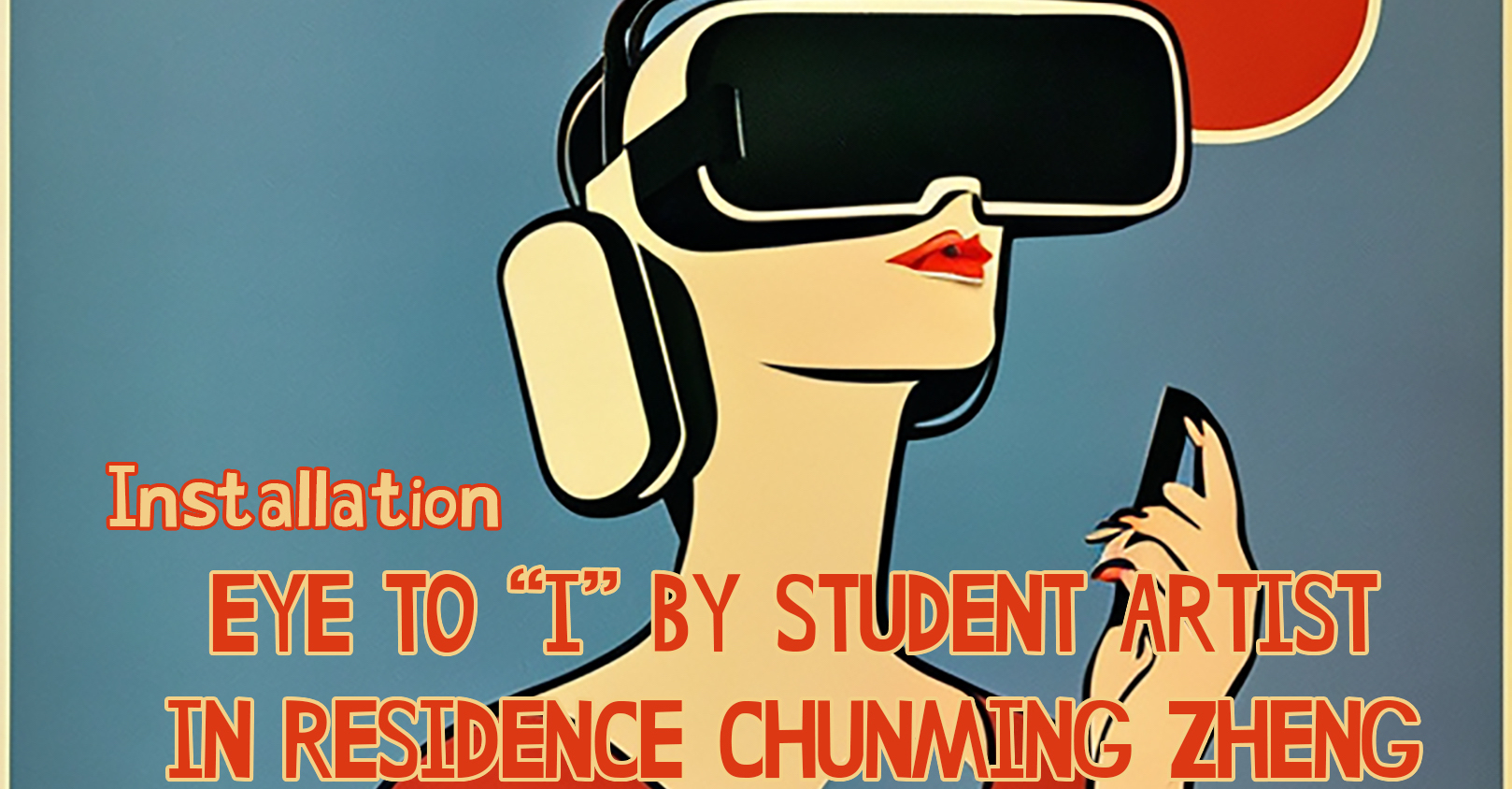
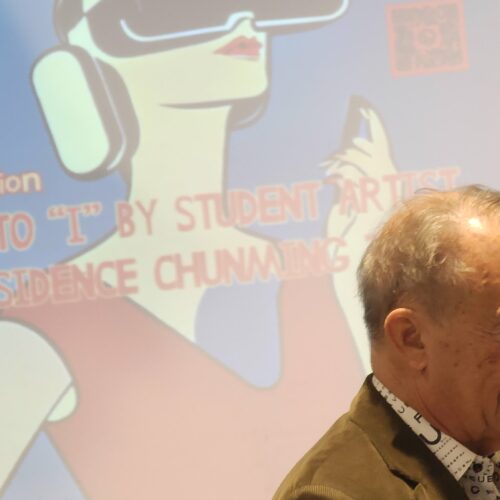
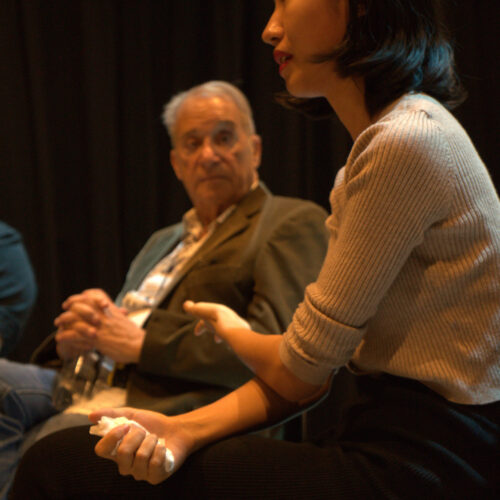
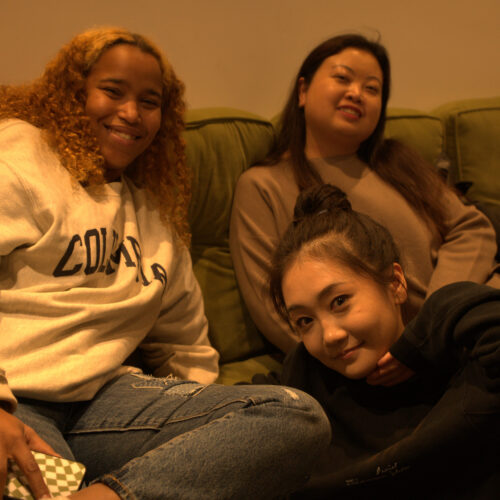
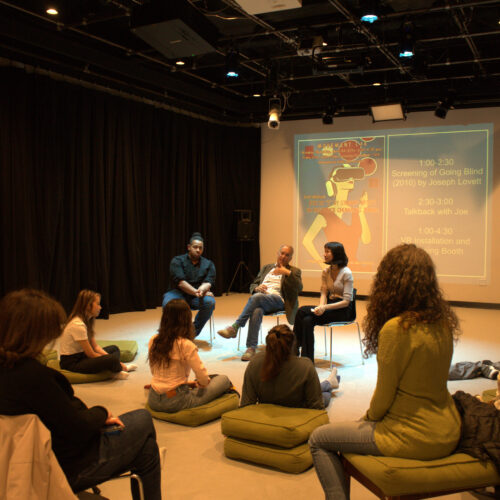
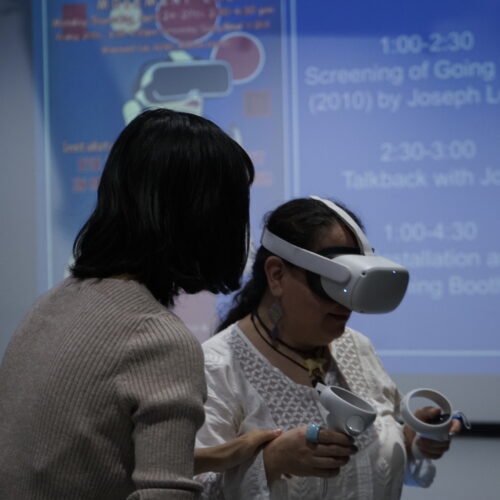
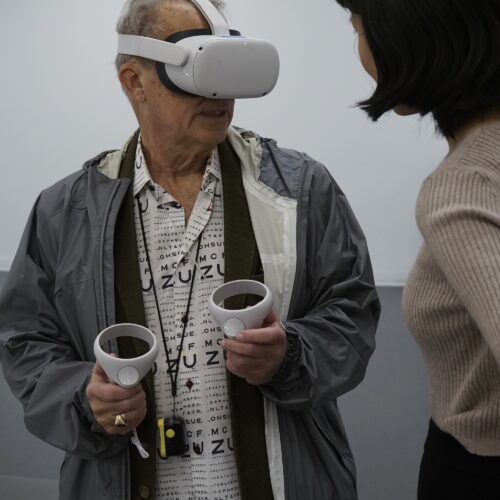
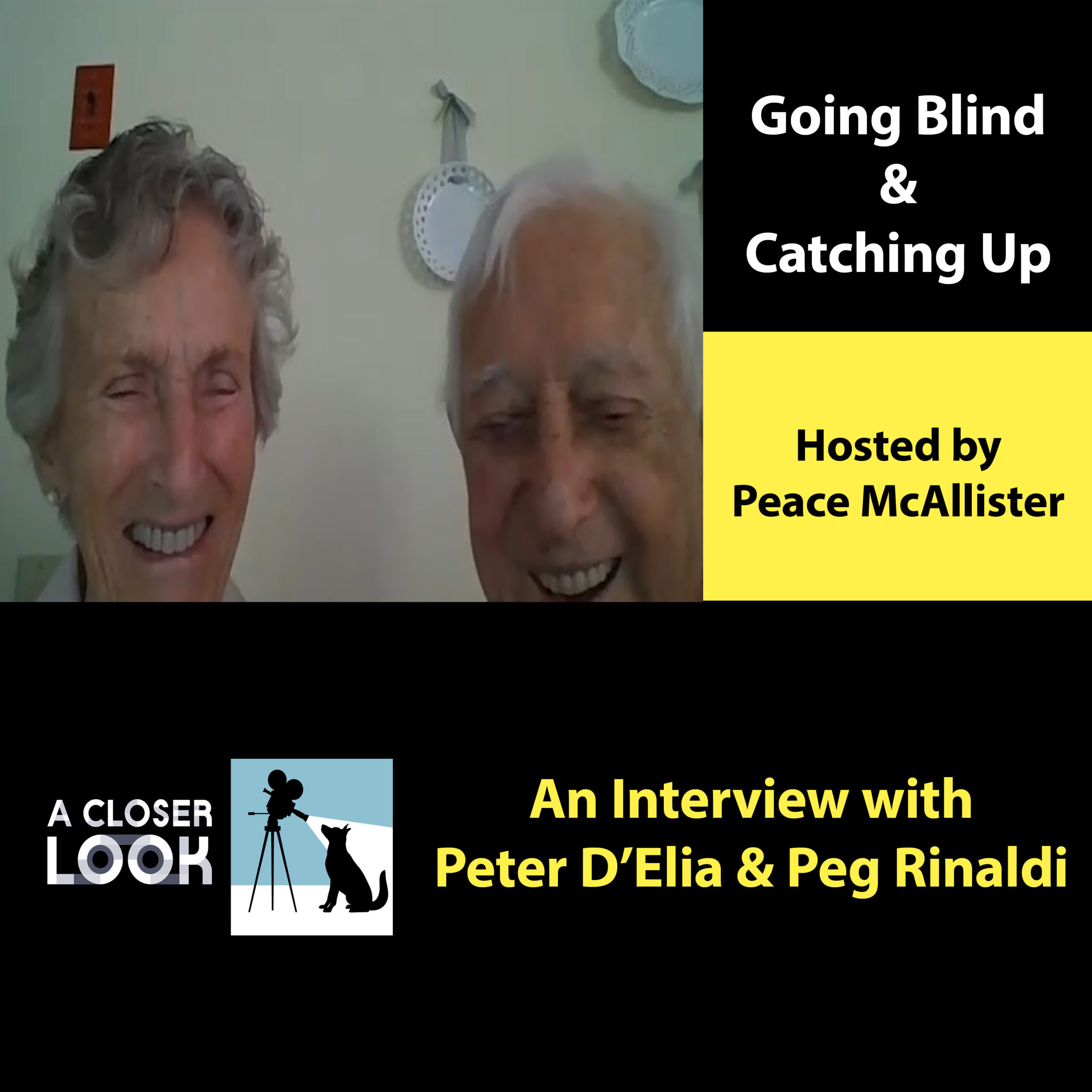
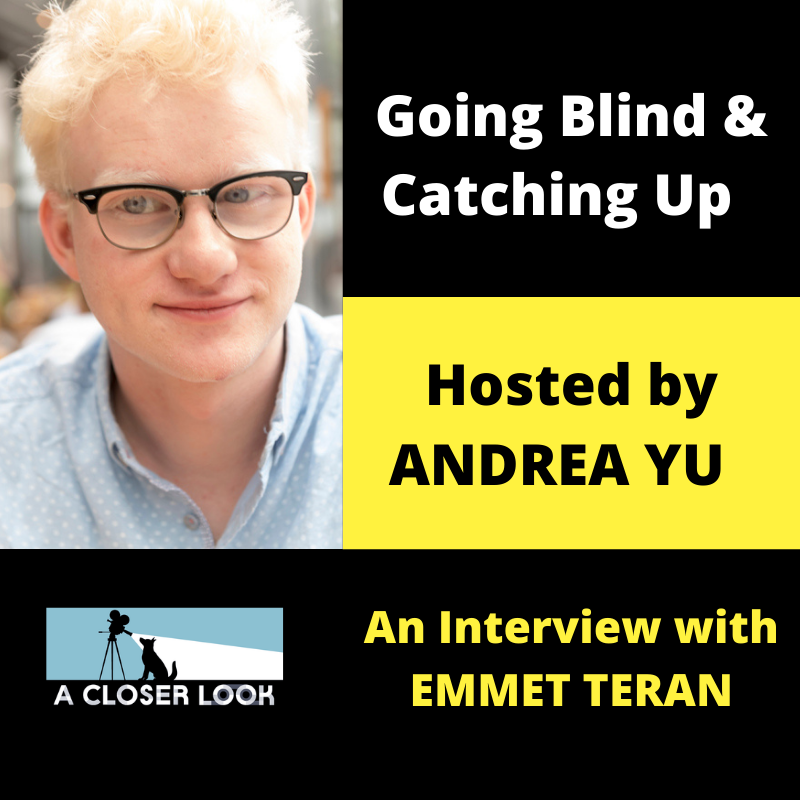
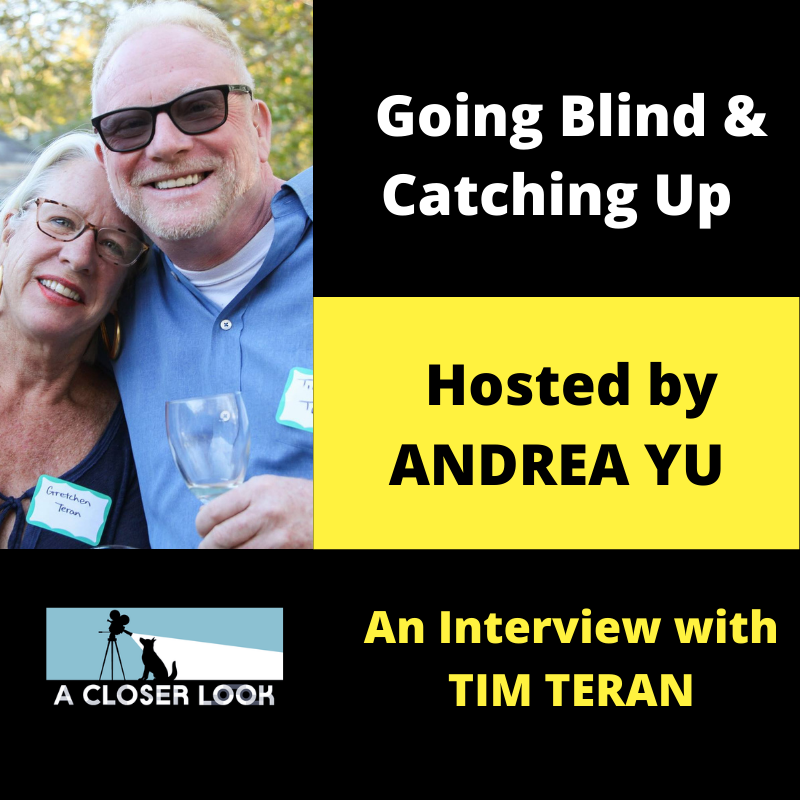
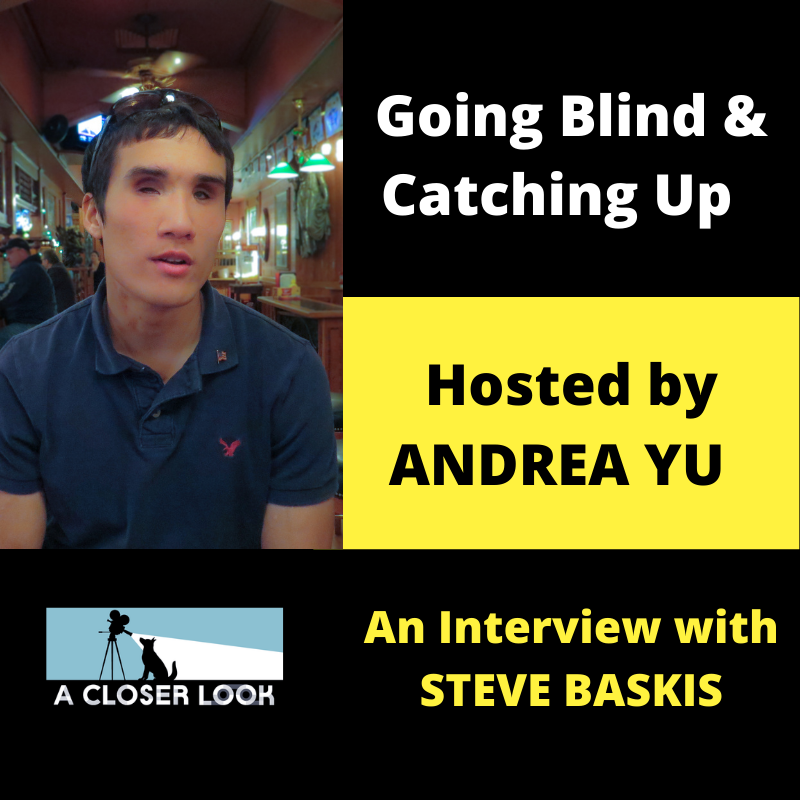
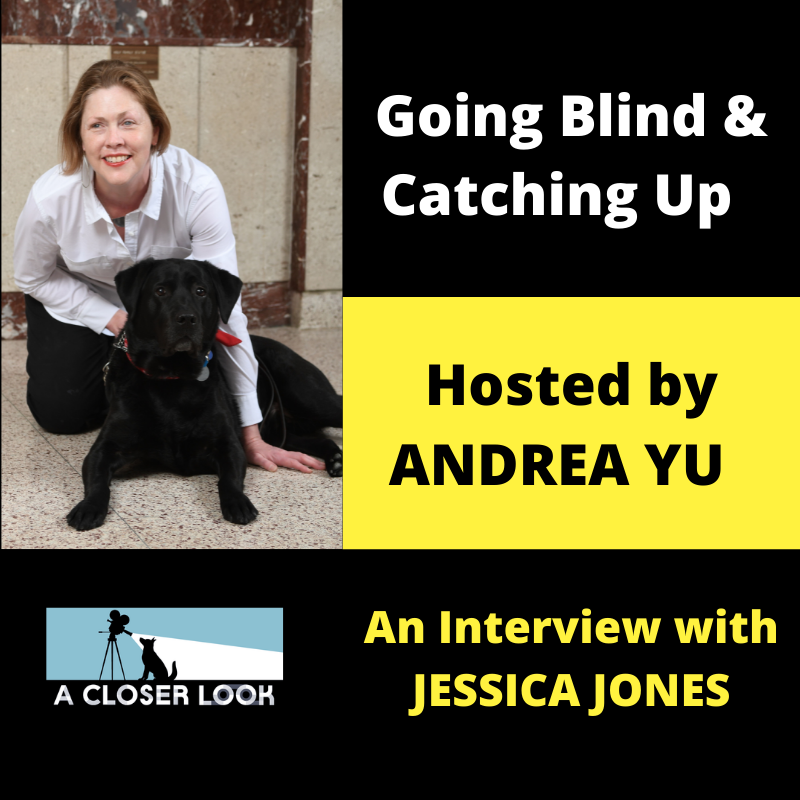

Recent Comments